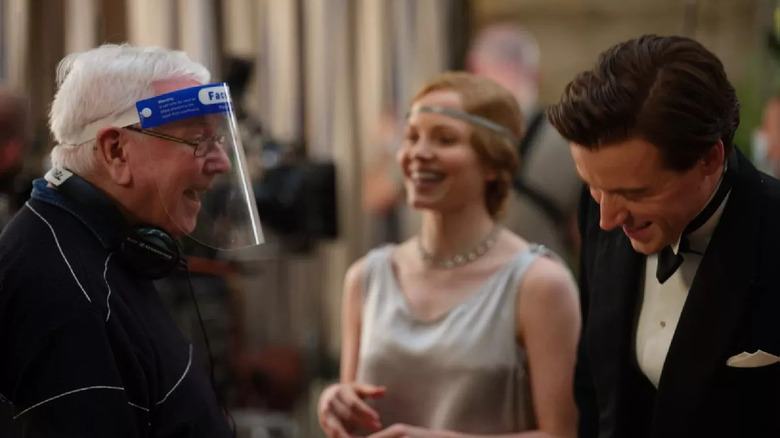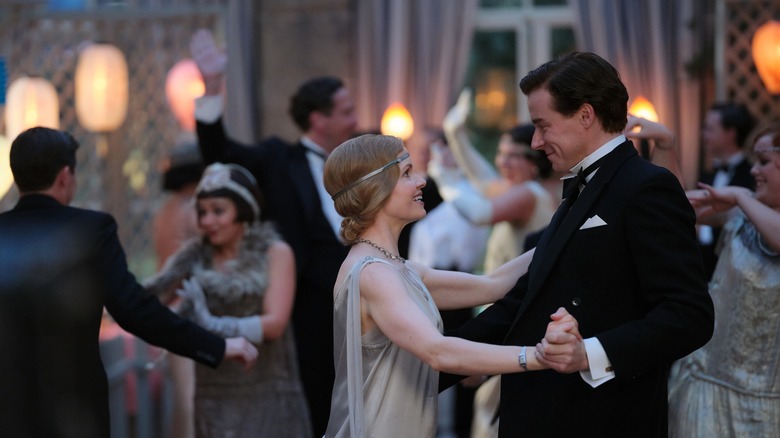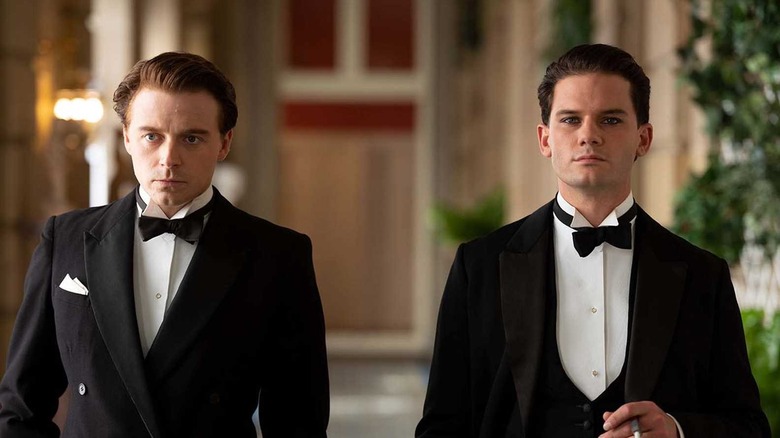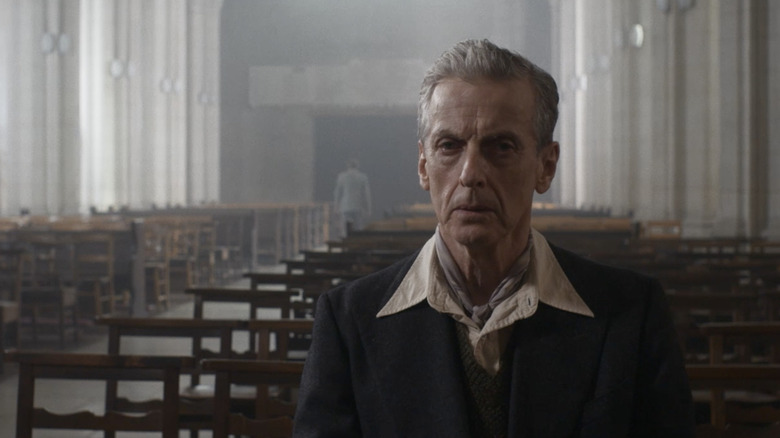Benediction Director Terence Davies Hasn't Found Redemption [Interview]
"Benediction" is a film about a man on the cusp of happiness. He yearns for so much: love, acceptance, redemption. But he only skirts around them, and never receives them, in one of the great quiet tragedies of this year.
Terence Davies ("A Quiet Passion") writes and directs "Benediction," a biographical drama about one of the most celebrated Great War poets, Siegfried Sassoon, renowned for his anti-war sentiments and his association with the Bright Young Things — the group of moneyed socialites in 1920s London — as well as his long-hidden homosexuality. But despite the legacy he left, and the famous people that he brushed shoulders with, the redemption that he sorely sought after evaded him.
"How do you bear happiness and loss and nonfulfillment and joy?" Davies said in an interview with /Film ahead of the release of "Benediction." For some, it's through repression or distractions; for Sassoon, it was a late-life conversion to Catholicism.
"I think he was looking for redemption," Davies said, "and you can't find redemption in other people, in art, religion, nothing, you can't. He didn't find it, and neither have I."
I spoke with Davies about making a war drama without the war, how to put a refreshing new spin on the biopic, and what he really thinks about Jane Austen movies.
'In a way, if you are an outsider, you don't really participate in life'
I read that you were drawn to the story of Siegfried Sassoon because he is an outsider, and you consider yourself an outsider. What is it about the outsider that makes them such an interesting subject for a film such as this?
Because, in a way, if you are an outsider, you don't really participate in life. There's part of you which is always secret and is always watching, and you don't know that's happening to you.
I didn't know when it started to happen to me as a child. I thought that everyone felt like that. Even in moments of utter happiness, I knew as a child that it was crazy, and I think that you become an observer as a protection because sometimes life is hard. How do you bear happiness and loss and nonfulfillment and joy?
That's why I'm drawn to people like him. Like I would be drawn to Emily Dickinson [with 2016's "A Quiet Passion"] for the same reason. I'm drawn to Anton Bruckner's music for exactly the same reason. I feel on the outside I've never been a participant in life. I'm far too conventional. I'm far too afraid to do anything that is remotely dangerous.
So apart from Sassoon's poems, what other sources did you look to when writing the script for "Benediction?"
Well, I had no idea of the kind of life he had led. I [read] three massive biographies, and he went everywhere. He knew everybody and it was just, "What on earth? Where do I start?" Which is why "Benediction" took six years to get to the screen.
I had to read all those biographies. I think, what do I respond to? What did I think I can actually make of it? Obviously, the fact that he was one of the Great War poets through the three Great War poets that we produced in this country.
He was gay, although he was very privileged, those privileged gays were never sentenced or sent to prison. A lot of them got married, which was quite usual at that time. Very naively for both the men and the women then. The thing that really shocked me was that he became a Catholic. I think, "Why on earth would you want to become a Catholic, for God's sake?"
I grew up as a Catholic and all it instills in you is guilt because it tells you that you've got to be pure and forward indeed. Well, how can you be? Even saints can't do that. So you always fail, and therefore you always have to confess.
I think Jewish people and Catholics really know what guilt is. We really are experts on guilt because it's kind of put into our souls.
Guilt plays a major part in the overall mood of this film. One of the integral parts, for example, is how the horrors of war haunts its survivors, but the film notably never shows or recreates any war scenes. What was the reason behind this particular choice?
Two. One practical, we had only 5 million pounds to make the film. So you can't reproduce what it was like in the trenches. Even if you've got billions and billions, you can't recreate what it was like. When you see that war footage, it's so powerful and so monstrous and beautiful.
I'd always said, "We've got to use war footage," because you just can't compete with that. It's so powerful and so moving. So I'd always wanted that.
But I say, on a very practical financial basis, there would be no way we could have recreated the trenches. You can't just recreate one trench and have soldiers that look a bit dirty. It really doesn't work.
'I think linear narrative has come to the end of its expressivity'
As a result of using that archival footage, the film kind of plays loose with time and chronology, becoming almost near documentary at some points while Sassoon narrates his poems over the archival footage of the war. Can you speak about this approach and skipping through major parts of Sassoon's life while using this footage to highlight his time at war?
Where the nature of screen time is concerned, I've always been interested in the nature of that and how it works, because the cut always implies the next thing which happened.
If you dissolve and then you cut, where is that time? Where actually are we? That comes directly from "Four Quartets" by [T.S.] Eliot, which I discovered when I was 18. One of the great poems in [that quartet] is about the nature of time. "For the roses had the look of flowers that are looked at." God, that is such a great phrase! Among many great phrases. But also about the quiet terrors that can come because of memories of the war. Because it was horrific. It must have been horrific to be in the first World War.
There's another wonderful moment in "Four Quartets" where he says, you get on a train, you settle down to magazines and letters and with the rails sliding behind you and "the growing terror of nothing to think about."
That I think is so powerful and true of Sassoon, but also, what do you do when you are the only one who has survived? Rupert Brooke and Wilfred Owen are automatically seen as great poets because they perished, and he didn't. He had to live with really being seen as the third one. I think that must have been very, very hard for him.
I follow "content dictates form," and if you follow that, if you listen with your inner ear and you watch with your inner eye, it will tell you where it wants to go.
I'm not interested in what happened next. I'm interested in what happens emotionally next. Certainly in terms of memory, you remember the intensity of the moment. That moment, nothing else, just the intensity of that moment. It sometimes takes a tiny thing to provoke it. A tiny thing can bring such joy or it can bring such pain.
I'm interested in that. I've always been interested in that. Although that's not to say that ... linear narrative is automatically a spent force. Some of the greatest films that were made are made in linear narrative, but I think linear narrative has come to the end of its expressivity.
'Why are we constantly making Jane Austen movies? They're bore-numbingly tedious!'
So when making a biopic, which is such a well-worn genre as it is, do you feel any pressure or need to refresh the formula as you did here with the "Benediction?"
No, not at all. You have to be truthful to the subject matter and that tells you can't sugar the pill. You have to face it, the truth, right on. That's the only way it can work. If you try to make it better, there's a betrayal. There's a betrayal about that. I don't mean this in any way offensive, but it is very typical of America wanting always to end with a hope.
It was Edith Wharton's best friend, who was also an American, said, "You don't understand, Edith: Americans want tragedy with a happy ending." I think it's true, and I think it's true of here now as well. It's absolutely true.
The problem here is worse. The problem here is period films, where everybody looks as if they've just come from hair, makeup, and costume, and you don't believe it for a second. Why are we constantly making Jane Austen movies? They're bore-numbingly tedious!
Well, speaking of the beauty and the aesthetics of that period, the notoriety of the Bright Young Things society is explored and undercut in "Benediction." It shows Sassoon partaking in the era's notorious wealth and debauchery, but being forced to lead a shadowy double life because of his sexuality. Which parts of his life did you choose to explore or parts of his relationships, while making this film?
Well, it wasn't so much while making it. It's always a gradual thing, from writing it to shooting it to cutting it, and cutting is the most difficult part. No, he was privileged. They all were, but you can't forget that homosexuality was a criminal offense in this country until 1967.
So there was always that area where it was dangerous, where you had to be careful to whom you reveal that. If you reveal it to others who are privileged, you're usually safe.
I think like a lot of men of that period, they married women because they thought the love of a good woman would cure them. Hester Gatty [Sassoon's wife], this is what she said to him. She said, "Stephen Tennant has told me everything I need to know," which is very heart touching, but very naive.
He asks her to marry him in a roundabout way. She replies in a roundabout way. It's not direct. He wasn't a good husband. He wasn't a particularly good father because you see photographs of her when she was very young and she's very beautiful. You see photographs of her when she's 50, and she looks completely drudged. She looks a drudge. He has to take responsibility for that.
Also he became very embittered. What you do when you are the only three of the great poets that have survived? You're seen as not quite at the top. Then I do feel, in a wider sense, when people who are talented, who don't get recognized, that really, really moves me more than I can say. [Like] Emily Dickinson and Anton Bruckner.
'I wanted to use 'Benediction' because it's slightly ironic'
What I liked about this film is that it doesn't just cover Sassoon's youth. It leaped forward to his older years as portrayed by Peter Capaldi. What was it about Sassoon's late life conversion to Catholicism that was so appealing to you to include in the film and bring it all home in terms of that cacophony of guilt and regret that made up his life?
It's the draw of memory and time, and how do you cope with that? Tiny losses or huge losses remain within you. That is the way I am.
I think he was looking for redemption, and you can't find redemption in other people, in art, religion, nothing, you can't. He didn't find it, and neither have I. That's why I think it touched something deep within me.
The promise of Catholicism is of course, like all religion, it's a complete lie. We die, and that's it. The function of religion really is two-fold. One, to control human sexuality, and the other is to make death palatable. Well, neither are palatable. It's as simple as that.
I don't know whether he got any sucker from it. I've no idea why. Certainly, when you're brought up a Catholic, of course, you don't know what the process is to become a Catholic. I read the process you've got to go through. It goes on for days.
It's longer than Wagner, but without any of the jokes. It's interminable! Going to cut this down to the absolute minimum because it's ridiculous. But it's offering him ... what do you expect from faith? Eternal life. Well, that's just sad. He has had eternal life in a way because we're still reading him, but not in the way that the church implies it.
We don't live happily ever after. I can't think of anything more tedious than sitting on some cloud with other angels, strumming some militantly glum hymn on a harmonium forever and ever. God knows that's awful.
So war, sexuality, religion are all at play and interplay with each other in "Benediction." The film's title obviously has religious roots. Do you see Sassoon's story as a particularly religious one?
No I don't. I wanted to use "Benediction" because it's slightly ironic. Because it's calling down a divine blessing, which he, of course, doesn't get. Which is what we want. When you want something as deeply as that, for it to be denied to you, it's very hard.
So you spoke before about him seeking redemption. What, in particular, do you think he was seeking redemption for — for surviving the war, for how he treated his wife and his marriage, for his mixed feelings about his own sexuality? Do you think it was for any particular thing?
I think it's all of those. I think at root you want be completely forgiven for everything, and only unconditional love can do that. You may find it in this world. If you do find it, speaking personally, I found it from my mother who was full of love, but I don't know where else you find it.
That is part of the drama, looking for something, and you don't find it. There's that wonderful moment in [the Henrik Ibsen play] "A Doll's House," when Nora says, "I waited for the miracle and it didn't come," and Torvald has no idea what she means.
"Benediction" is now playing in theaters.




